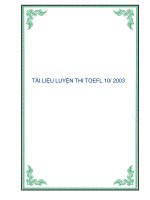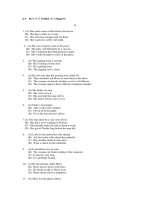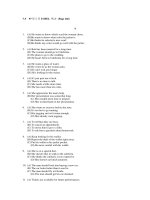Tài liệu TÀI LIỆU LUYỆN THI TOEFL 01/ 1999 docx
Bạn đang xem bản rút gọn của tài liệu. Xem và tải ngay bản đầy đủ của tài liệu tại đây (87.23 KB, 17 trang )
9-1 99 年1月TOFEL 听力
A
1. (A) He wants to go early to avoid a traffic jam.
(B) He wants to leave the theater before the movie is over.
(C) He doesn't know the way to the theater.
(D) He doesn't usually get up at 7:00.
2. (A) Walk around the corner to the next block.
(B) Take a taxi to the hotel.
(C) Telephone the hotel for directions.
(D) Wait in the candy store.
3. (A) Borrow her book.
(B) Check the classroom again.
(C) Buy a new book.
(D) Ask about the book at the information desk..
4. (A) Linda didn't like it.
(B) Bill lost it.
(C) It was very expensive.
(D) It was very small.
5. (A) Take later classes.
(B) Discuss the problem with her professor.
(C) Come to campus by a different route.
(D) Live closer to campus.
6. (A) She often goes to the beach.
(B) She got a weekend job at the beach.
(C) She misses the trips to the beach she used to take.
(D) Her home is near the beach.
7. (A) Continue to read.
(B) Meet the woman at the library.
(C) Make some coffee.
(D) Go out with some friends.
8. (A) What she can do to help the man.
(B) How long the man has had allergies.
(C) What is causing the man's problem.
(D) What the man just said.
9. (A) He already has plans for Saturday night.
(B) The woman should decide where to cat Saturday.
(C) The woman should ask her brother for a suggestion.
(D) He will make a reservation at the restaurant.
10. (A) She'll drop the man off on the way to work.
(B) The man can ride downtown with her.
(C) The man will have to leave earlier than usual.
(D) She can't give the man a ride.
11. (A) Her backhand is almost perfect.
(B) The time the man spent practicing has helped him.
(C) The man's mother wanted him to practice.
(D) Her mother is a good tennis coach.
12. (A) Her brother was not accepted into law school.
(B) She doesn't want to be a criminal lawyer.
(C) She has decided not to go to law school.
(D) She doesn't plan to work in her brother's law firm.
13. (A) The man will probably receive a scholarship.
(B) She can't give the man a ride to the dean's office.
(C) She can lend the man a sweater.
(D) The man isn't dressed appropriately for the interview.
14. (A) Buy a car from the woman.
(B) Help the woman paint her car.
(C) Buy a new car.
(D) Look for a less expensive car.
15. (A) She's upset that she missed the television program.
(B) She doesn't think the television program was funny.
(C) She doesn't like talking about television programs.
(D) She watched the television program at a friend's house.
16. (A) Cleaning the pants will take longer than usual.
(B) The man can have his pants at the end of the day.
(C) She doesn't think the stain can be removed.
(D) The man should go to a different location.
17. (A) She is going to try to be more persuasive.
(B) She'll accept the committee's proposal.
(C) She thinks the committee will accept the proposal.
(D) She'll revise the proposal before she talks to the committee.
18. (A) It's new.
(B) It's dull.
(C) It's not clean.
(D) It has a broken handle.
19. (A) Meet her in the auditorium.
(B) Schedule the meeting for a different time.
(C) Reserve a large room for the meeting.
(D) Cancel the meeting.
20. (A) The man may have left the paper in the phone book.
(B) The man should call Laura for her address.
(C) Laura's house is not difficult to find.
(D) Laura's address probably appears in the telephone directory.
21. (A) He doesn't believe the weather forecast.
(B) He doesn't like humid weather.
(C) He just bought an air conditioner.
(D) He can fix the woman's air conditioner.
22. (A) The man should sleep more.
(B) The man should get some exercise.
(C) It's important to finish the report now.
(D) The man needs to concentrate harder.
23. (A) He doubts the woman will like the novel.
(B) He hasn't started reading the novel yet.
(C) He enjoyed reading the novel.
(D) He'll lend the woman the novel after he has read it.
24. (A) He is pleased the exhibit has closed.
(B) He has already seen the exhibit.
(C) He is disappointed the exhibit has closed.
(D) He already knew the exhibit had closed.
25. (A) Remove George from the committee immediately.
(B) Warn George that his attendance problem is serious.
(C) Offer to help George during the meeting.
(D) Telephone George to see if he's coming to the meeting.
26. (A) He'll pay the woman earlier.
(B) He was Able to sell the tickets for the woman.
(C) He doesn't mind buying the tickets.
(D) He hopes to see the woman on Friday.
27. (A) Where the manager is.
(B) Where she will be working this month.
(C) Where she can find the work schedule.
(D) Where the man heard the news.
28. (A) She needs help finding a place to live.
(B) There aren't enough rooms available in the dormitories.
(C) She can't afford to live on campus.
(D) She doesn't want to live in university housing.
29. (A) She would like to see the film again.
(B) She has seen the movie more than once.
(C) She thinks the movie lasted a long time.
(D) She thinks the movie was a waste of time.
30. (A) They didn't get wet.
(B) They're late for the concert.
(C) They prefer to dress casually.
(D) They're really looking forward to the concert.
31. (A) How to care for precious metals.
(B) A standard unit for measuring weight.
(C) The value of precious metals.
(D) Using the metric system.
32. (A) To check the accuracy of scales.
(B) To calculate the density of other metals.
(C) To observe changes in the atmosphere.
(D) To measure amounts of rainfall.
33. (A) Someone spilled water on it.
(B) Someone lost it.
(C) It was made of low quality metal.
(D) The standard for measuring had changed.
34. (A) It is a small amount to pay for so much precious metal.
(B) It is difficult to judge the value of such an object.
(C) It is reasonable for an object with such an important function.
(D) It is too high for such a light weight.
35. (A) He is unable to attend her class.
(B) He wants to deliver something to her office.
(C) He wants to hand in a late assignment.
(D) He wants to drop her course.
36. (A) Find out about a course.
(B) See an adviser.
(C) Drop off a paper.
(D) Go to a meeting.
37. (A) Paint a landscape.
(B) Give an oral report.
(C) Take a final exam.
(D) Buy several books.
38. (A) Come to her office before her meeting.
(B) Change his major.
(C) Meet with her tomorrow.
(D) Discuss the class with his roommate.
39. (A) Traditional European architecture.
(B) Techniques for building log cabins.
(C) The history of log structures.
(D) How to build a home by yourself.
40. (A) Their small size.
(B) Their rustic dirt floors.
(C) Their walls of rounded logs.
(D) Their sliding board windows.
41. (A) They liked the look of log homes.
(B) They had easy access to logs.
(C) They were unfamiliar with other building materials.
(D) They wanted to break away from European traditions.
42. (A) They could easily build the log houses themselves.
(B) They could construct the houses from kits.
(C) They liked the cozy atmosphere of the log interior.
(D) They wanted homes that could be transported.
43. (A) It was built by the Canadians.
(B) It was built to facilitate trade.
(C) The path for the road was extremely difficult to clear.
(D) Hostilities between Canada and the United States caused construction delays.
44. (A) Maine was less influenced by the French government.
(B) Maine had better employment opportunities.
(C) Maine was politically stable.
(D) Marine had a better climate.
45. (A) The area was economically unified.
(B) The authorities were unable to enforce law and order.
(C) The two governments fought for control of the area.
(D) Most of the people living there spoke only French.
46. (A) The latest practices of accurate mapmaking.
(B) The impact of epidemics on mass migration.
(C) The advantages of establishing international trade agreements.
(D) The technology used to locate the Old Canada Road.
47. (A) Watch a slide show about trees.
(B) Learn how to prevent Dutch elm disease.
(C) Study the history of the campus buildings and grounds.
(D) Look at examples of trees on campus.
48. (A) History.
(B) Physical education.
(C) Botany.
(D) Architecture.
49. (A) Its leaves are yellow.
(B) Its leaves are lopsided.
(C) It is very tall.
(D) It is not an angiosperm.
50. (A) It has grown too tall for its designated space.
(B) It may be diseased.
(C) Its branches are being broken off.
(D) It no longer hears from.
99 年 1 月 TOFEL 语法
B
1. Among the first plants to grow on the land regions of the Earth _____, which in prehistoric
times grew to immense size
(A) were horsetail rushes
(B) horsetail rushes
(C) horsetail rushes were
(D) and horsetail rushes
2. Unlike fossil fuels, which can be used only once, wind and solar power _____of energy.
(A) for renewable sources
(B) the sources are renewable
(C) are renewable sources
(D) renewable sources
3. _____ that the first cheese was probably made more than 4,000 years ago by nomadic tribes
in Asia.
(A) The belief
(B) Although they believe
(C) It is believed
(D) Believing
4. Today _____ of the Earth live on a very small percentage of the Earth's land surface.
(A) about two-thirds populated
(B) the population is about two-thirds
(C) about two-thirds of the population
(D) of about two-thirds the population is
5. It was in the year 1792 _____
(A) THAT THE New York Stock Exchange was founded
(B) founding the New York Stock Exchange
(C) which year the New York Stock Exchange was founded
(D) the New York Stock Exchange founded
6. Many small birds use new sites for each nesting,_____ large birds often reuse the same nest.
(A) by
(B) how
(C) within
(D) whereas
7. Plateaus are often referred to as tablelands _____ essentially flat-topped and stand
conspicuously above an adjacent land area.
(A) because are
(B) because they are
(C) because of their
(D) which because they are
8. Although many contemporary craft objects are not _____, they generally have their roots in
function.
(A) function
(B) functionally
(C) as function
(D) functional









